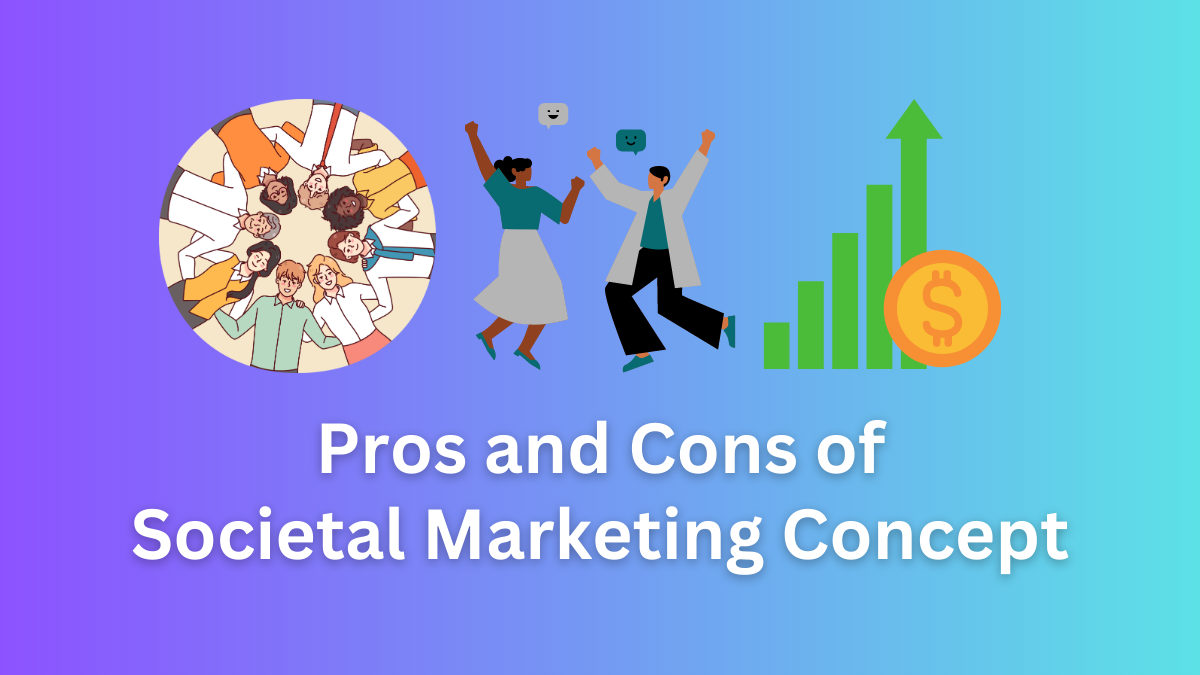Pros and Cons of Societal Marketing Concept
The societal marketing concept is also called the social concept of marketing, which refers to the marketing philosophy that considers three aspects of marketing – customer needs satisfaction, social welfare, and the company’s profit.
Let’s explore the key pros and cons of societal marketing concept.
Pros of Societal Marketing Concept
The Societal Marketing Concept holds several advantages that not only benefit businesses but also contribute positively to society and the environment. Here are eight significant pros of adopting the Societal Marketing Concept:
Positive Social Impact
Societal marketing places a strong emphasis on products and services that contribute to society’s betterment. By addressing environmental concerns, supporting human welfare, and contributing to community development, companies actively contribute to making a positive impact on people’s lives.
Enhanced Company Reputation
When businesses actively engage in initiatives that prioritize societal welfare, their reputation improves significantly. Consumers are more inclined to support and trust companies that demonstrate a genuine commitment to social responsibility. This enhanced reputation fosters increased trust and loyalty among consumers.
Related: The Marketing Concept
Long-term Customer Relationships
Companies that align their focus with both customer satisfaction and societal well-being tend to cultivate strong and enduring customer relationships. Satisfied customers are more likely to remain loyal over the long run, and they often share their positive experiences through word-of-mouth recommendations.
Competitive Advantage
Embracing the Societal Marketing Concept can provide businesses with a distinctive edge over their competitors. Offering products that cater to consumers’ needs while addressing broader societal concerns creates a unique selling proposition that resonates with socially conscious consumers.
Increased Sales and Profit
By addressing societal needs and producing socially responsible products, companies can experience a surge in demand. Consumers today prioritize products that align with their values, making socially responsible products more attractive and likely to result in increased sales and profitability.
Favorable Public Image
Companies that actively contribute to societal welfare garner positive public perception. This positive image not only attracts more consumers but also appeals to potential investors, partners, and prospective employees seeking to associate themselves with socially responsible organizations.
Read Also: 8 Pros and 7 Cons of Selling Concept of Marketing
Environmental Preservation
Societal marketing encourages businesses to adopt eco-friendly practices, significantly reducing their negative impact on the environment. This approach leads to sustainable resource usage, pollution reduction, and an overall commitment to conservation efforts.
Innovation and Adaptation
Companies that embrace the Societal Marketing Concept often find themselves driven to innovate. Balancing consumer demands and societal well-being necessitates creative thinking, encouraging the development of solutions that benefit both consumers and society.
Cons of Societal Marketing Concept
While the Societal Marketing Concept brings numerous benefits, it also comes with certain challenges that businesses need to consider. Here are seven notable cons associated with adopting the Societal Marketing Concept:
Higher Costs
Implementing socially responsible practices often requires additional investments in research, development, and production. These costs can be substantial, potentially affecting the overall profitability of the business.
Read Also: 8 Pros and 7 Cons of Production Concept of Marketing
Limited Consumer Interest
Despite growing awareness, not all consumers prioritize socially responsible products. Some may still prioritize affordability or convenience over ethical considerations, potentially resulting in limited demand for socially conscious offerings.
Complexity in Execution
Balancing customer satisfaction, societal welfare, and profitability can be tough. Businesses must navigate complex decisions and trade-offs while ensuring that the implemented strategies align with all three considerations.
Resistance to Change
Transitioning to a Societal Marketing approach may face resistance from within the organization. Employees, particularly those accustomed to traditional approaches, may be reluctant to adopt new strategies and practices.
Potential Greenwashing
Some companies might engage in greenwashing, a practice where they falsely market their products as environmentally friendly or socially responsible without genuine commitment. This undermines the credibility of the concept and confuses consumers.
Short-Term Profit Sacrifice
Societal Marketing focuses on long-term societal well-being, which may require sacrificing short-term profitability. This can be challenging for companies seeking immediate financial gains and shareholder value.
Competitive Disadvantage
In industries where competitors prioritize profit maximization over societal welfare, companies embracing Societal Marketing might face a competitive disadvantage due to higher costs and potentially lower short-term profits.
Read Next: 8 Pros and 7 Cons of Marketing Concept
Arti Kushmi holds a BBS (Bachelor in Business Studies) degree and shares her business and marketing knowledge through this website. While not writing she will be reading and enjoying the moment.
